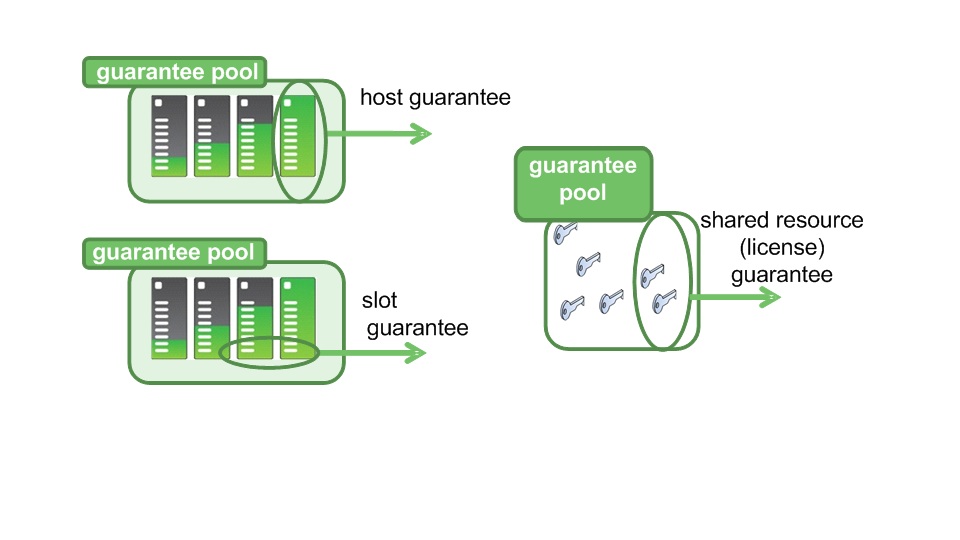About guaranteed resources
Guaranteed resource pools provide a minimum resource guarantee to consumers, and can optionally loan out guaranteed resources not in use. During job scheduling the order in which jobs are scheduled does not change, but some jobs have access to additional guaranteed resources. Once the guaranteed resources are used, jobs run outside the guarantee following whatever other scheduling features are configured.
Use guaranteed resources when you want LSF to reserve some amount of resources for a group of jobs. LSF allows for guarantees of:
- Whole hosts
- Slots
- "Packages” composed of a number of slots and some amount of memory together on a host
- Licenses managed by License Scheduler
LSF uses service classes in order to group jobs for the purpose of providing guarantees. In the context of guarantees, a service class can be thought of as simply a job container. A job can be submitted to a service class with the bsub –sla option. You can configure access controls on a service class to control which jobs are allowed to use the service class. As well, you can configure LSF to automatically associate jobs with a service class that meet the access control criteria. A job can belong to at most one service class.
A guarantee policy requires you to specify the following:
- Resource pool: The pool is specified by a type of resource (whole hosts, slots, packages, or licenses). Also, for host-based resources (hosts, slots, and packages) you may specify the set hosts from which the resources are to be reserved.
- Guarantees: These are the amounts of the resource in the pool that should be reserved for each service class.
Note that a service class can potentially have guarantees in multiple pools.

Prior to scheduling jobs, LSF determines the number of free resources in each pool, and the number of resources that must be reserved in order to honor guarantees. Then, LSF considers jobs for dispatch according to whatever job prioritization policies are configured (queue priority, fairshare, job priority). LSF will limit job access to the resources in order to try to honor the guarantees made for the service classes.
Optionally, a guarantee policy can be configured such that resources not needed immediately for guarantees can be borrowed by other jobs. This allows LSF to maximize utilization of the pool resources, while ensure that specific groups of jobs can get minimum amounts of resources when needed.
Note that a guarantee policy will not affect job prioritization directly. Rather, it works by limiting the number of resources in a pool that a given job can use, based on the job’s service class. The advantage of this approach is that guarantee policies can be combined with any job prioritization policy in LSF.
Normally, a pool will have a greater number of resources than the number of resources guaranteed from the pool to service classes. Resources in a pool in excess of what is required for guarantees can potentially be used by any job, regardless of service class, or even by jobs that are not associated with a service class.